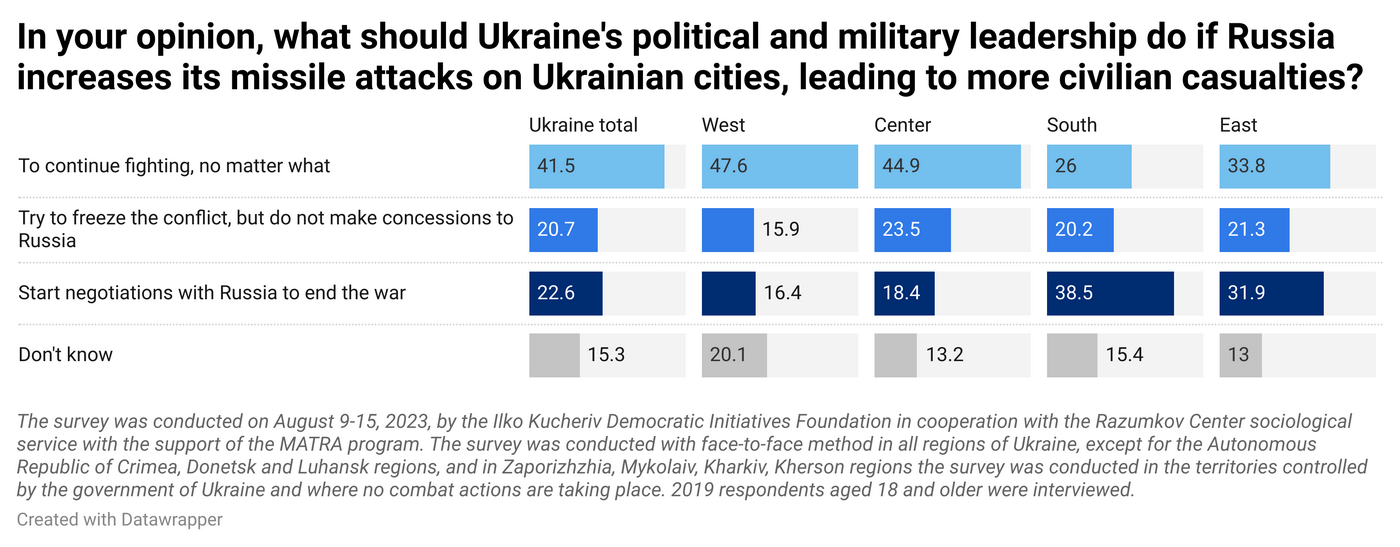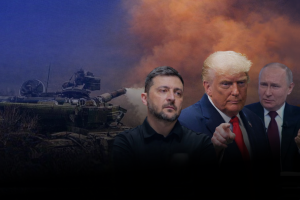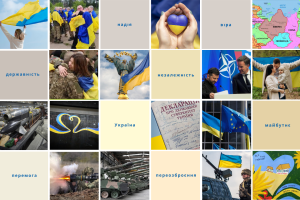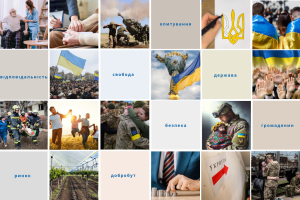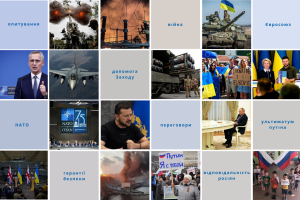The opinion poll was conducted from August 9 to 15, 2023 by Ilko Kucheriv Democratic Initiatives Foundation in cooperation with the Razumkov Center sociological service with the support of the MATRA program funded by the Embassy of the Kingdom of the Netherlands in Ukraine.
The survey was conducted using face-to-face method in the following regions:
- Volyn, Zakarpattia, Ivano-Frankivsk, Lviv, Rivne, Ternopil, Chernivtsi regions (Western macro region);
- Vinnytsia, Zhytomyr, Kyiv, Kirovograd, Poltava, Sumy, Khmelnytskyi, Cherkasy, Chernihiv regions and in Kyiv city (Central macro region);
- Mykolaiv, Kherson and Odesa regions (Southern macro region);
- Dnipropetrovsk, Zaporizhzhia, Kharkiv regions (Eastern macro region)
The survey was conducted using a stratified multi-stage sample. The structure of the sample reflects the demographic structure of the adult population of the surveyed territories as of the beginning of 2022 (by age, gender, type of settlement).
2019 respondents aged 18 and older were interviewed. The theoretical sampling error does not exceed 2.3%. At the same time, additional systematic sample deviations may be caused by the consequences of Russian aggression, in particular, the forced evacuation of millions of citizens.
Key findings of the study
1. Assessment of the situation in the country, the value of the state and citizenship amid the war
Almost half of Ukrainians (49%) believe that events in Ukraine are developing in the right direction, about a third (32%) think that they are developing in the wrong direction, and the rest are not sure.The last time positive assessments prevailed was in 2019, after the presidential and parliamentary elections, when most citizens showed high confidence in the authorities and had positive expectations for future reforms in the country.
However, in the short term, these expectations were not met, and in 2020-2021, negative assessments of developments in the country dominated.
The predominance of positive assessments in 2022-2023 is obviously not because citizens consider a full-scale war to be a positive phenomenon. More likely, the full-scale war has changed the prism through which Ukrainians assess the situation in the country. In the context of a full-scale war, the Ukrainian state and people have faced an existential threat. However, both the state and the people have shown the will to resist, and Ukraine has been effectively resisting the aggressor for a year and a half. Most likely, positive assessments now prevail precisely because of the growing value of their state in the eyes of Ukrainians, who have never faced such large-scale threats to their existence before.

The region or age of respondents did not make a significant difference in assessing the situation in the country, although relatively fewer positive assessments were observed in the South. The financial situation of citizens had a significant impact on their opinion of the situation in the country: positive assessments prevailed among Ukrainians with higher incomes, and vice versa - less wealthy respondents tended to assess the developments in Ukraine negatively.
- The vast majority of Ukrainians (69%) consider the collapse of the USSR a positive historical event. This opinion is most widespread among residents of the West of Ukraine (91%). In the South of our country, this opinion is somewhat less common (42%), but there is no massive nostalgia for the USSR there either (23%), while in this macro-region there are the highest number of those who have not decided on the answer (35%).
 Back in 2020, the regional distribution showed completely opposite opinions of residents of the West and Center and residents of the South and East of our country on the collapse of the USSR.
Back in 2020, the regional distribution showed completely opposite opinions of residents of the West and Center and residents of the South and East of our country on the collapse of the USSR.

"Nostalgia" for the USSR is more likely to be found among older generations (although older people are also mostly positive about the collapse of the USSR), as well as among people with lower levels of income.
- Nearly 40% of Ukrainians believe that more positive events have occurred since Ukraine's independence, while another 40% said that as many positive as negative events have occurred. The highest share of positive assessments was registered in the West of our country (59%), somewhat less - in the South (26%), but in all regions no more than 15% believe that more negative events have occurred since independence.

The full-scale war and the growing value of the state in the eyes of citizens have led to a rethinking of their past life in independent Ukraine. The number of those who believe that there have been more positive events since independence has increased significantly, while the share of pessimists has decreased.
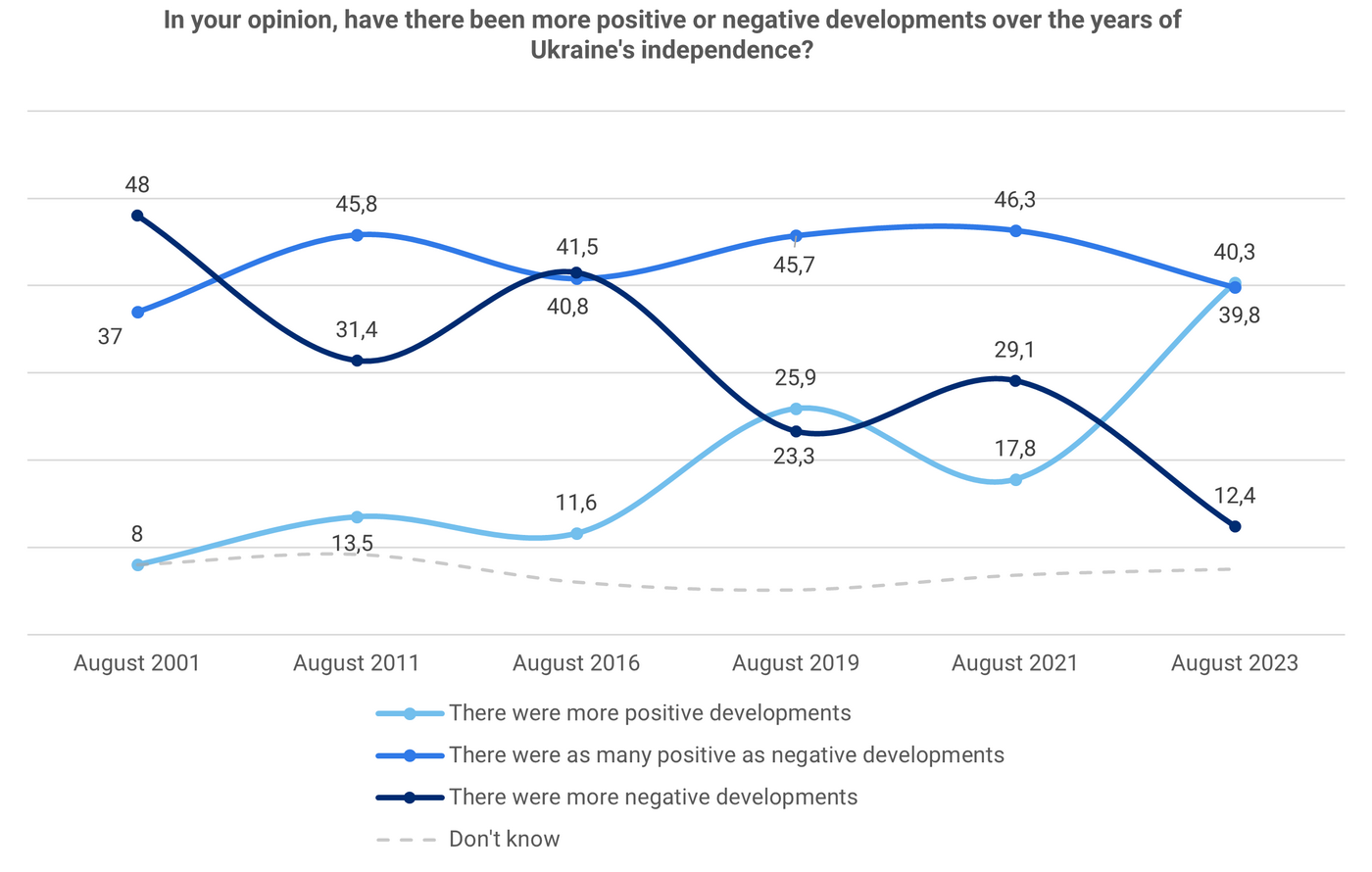
- If a referendum on Ukraine's state independence was to be held today, the vast majority of Ukrainians (82%) would support Ukraine's independence. The highest number of those who would support independence is in the West of our country (94%). In the South and East, 68% and 70% respectively. Those who are against constitute 3% of the country as a whole, with less than 1% in the West and about 7% in the East.
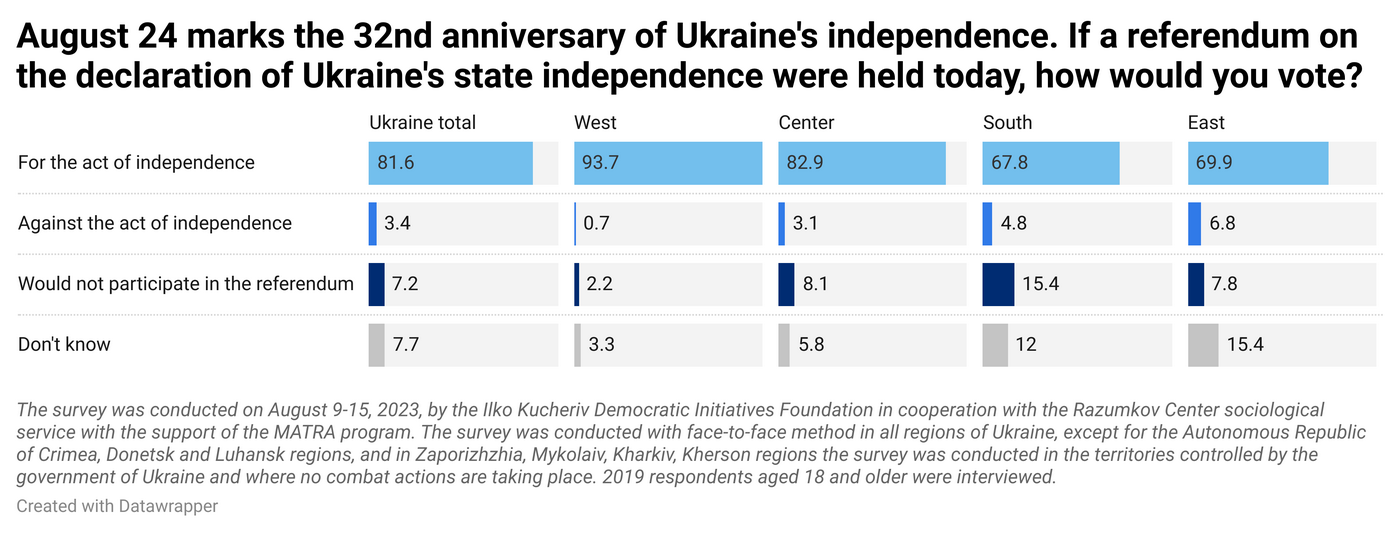
Support for independence is now the highest in over 20 years. Support has increased even compared to the period 2014-2021, when it was already dominant compared to the periods before 2014.
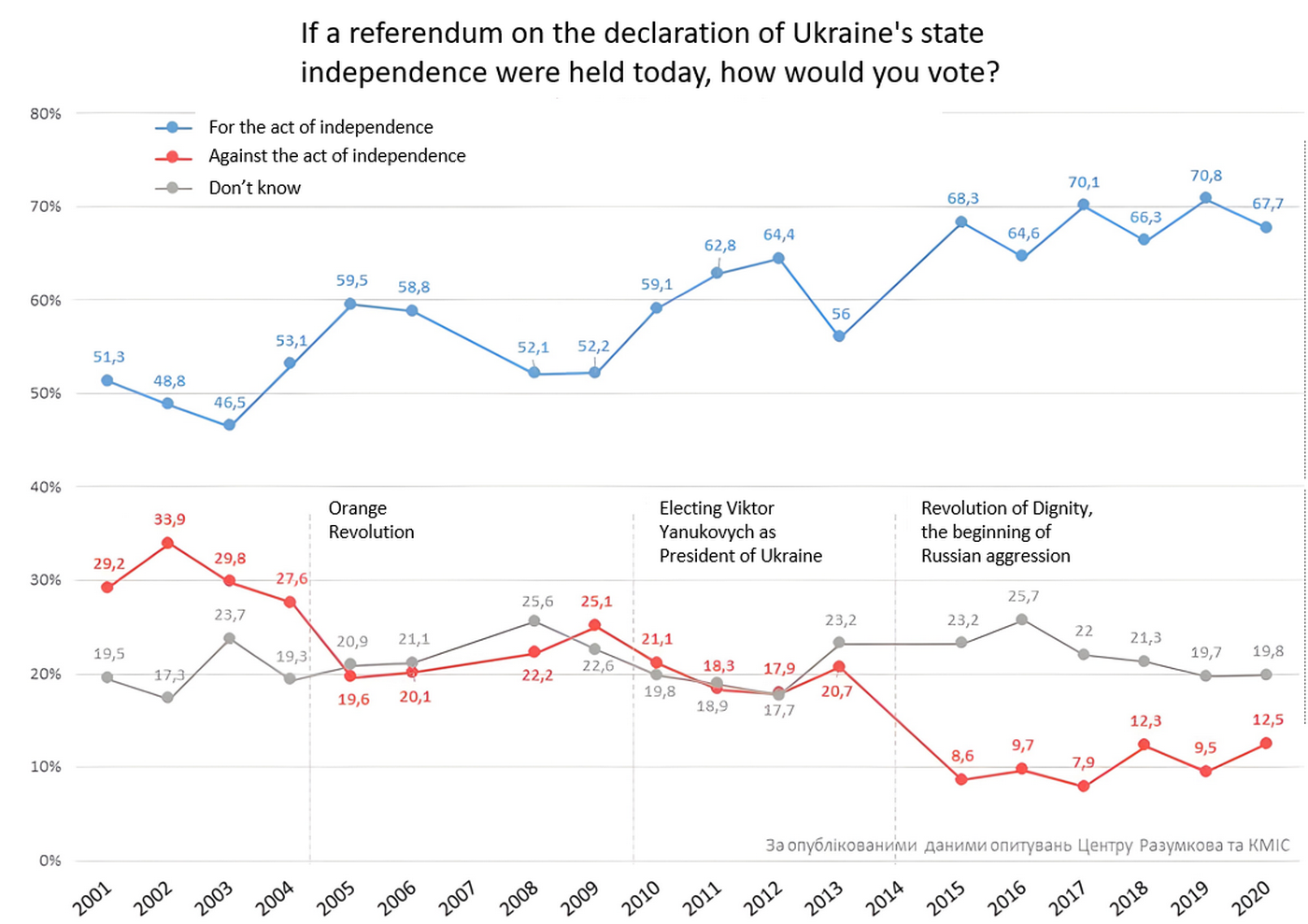
Visualization source: Rozymnyi О. Independence of Ukraine as a Choice. Razumkov Center. URL: https://razumkov.org.ua/statti/nezalezhnist-ukrainy-iak-vybir.
- The vast majority of Ukrainians (almost 89%) are proud of their citizenship. Most of them are in the Western (95%), Central (90%), and Southern (89%) macro-regions, and somewhat less in the East of Ukraine (76%).
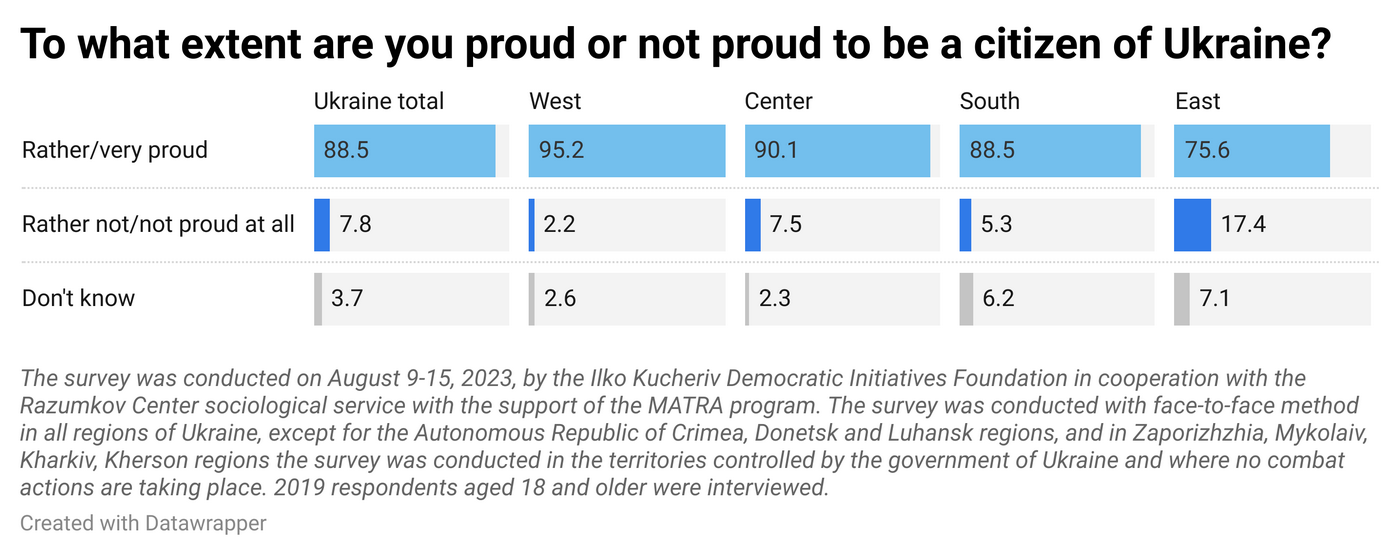
Pride in citizenship is now the highest it has been since Ukraine's independence.
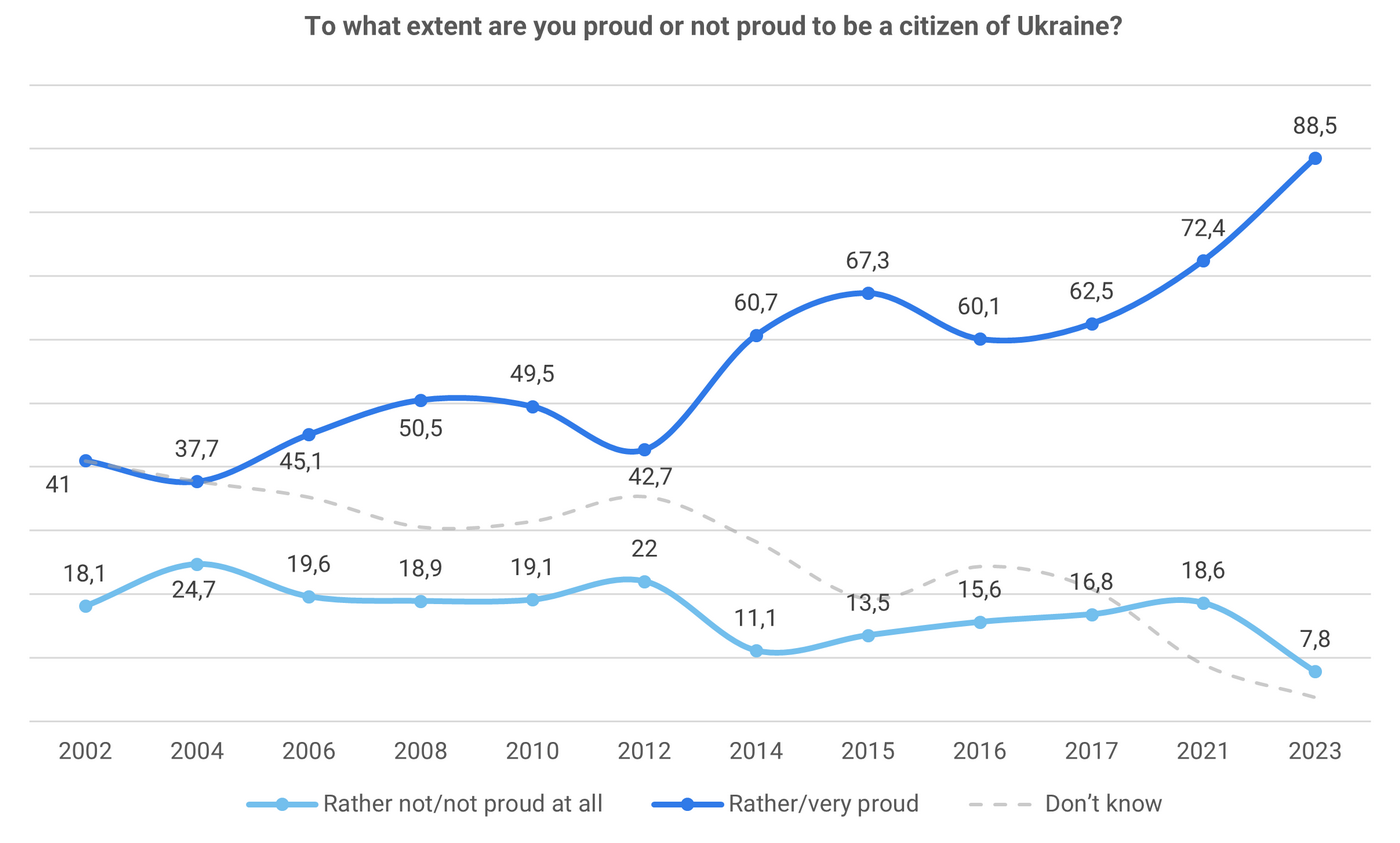
2. Replacing the Soviet coat of arms with a Ukrainian trident on the Motherland monument: an important symbolic step or an improper use of funds during the war?
- At the time of the survey, 83% of respondents had heard about the initiative to replace the USSR coat of arms with a Ukrainian trident on the shield of the Motherland monument in Kyiv. 17% had not heard anything about it.
- Overall, Ukrainians reacted favorably to this initiative: 67% were positive about the decision, while only 16% were negative, and the rest were undecided or indifferent. Positive attitudes are highest in the West of the country, as well as among young and middle-aged Ukrainians.
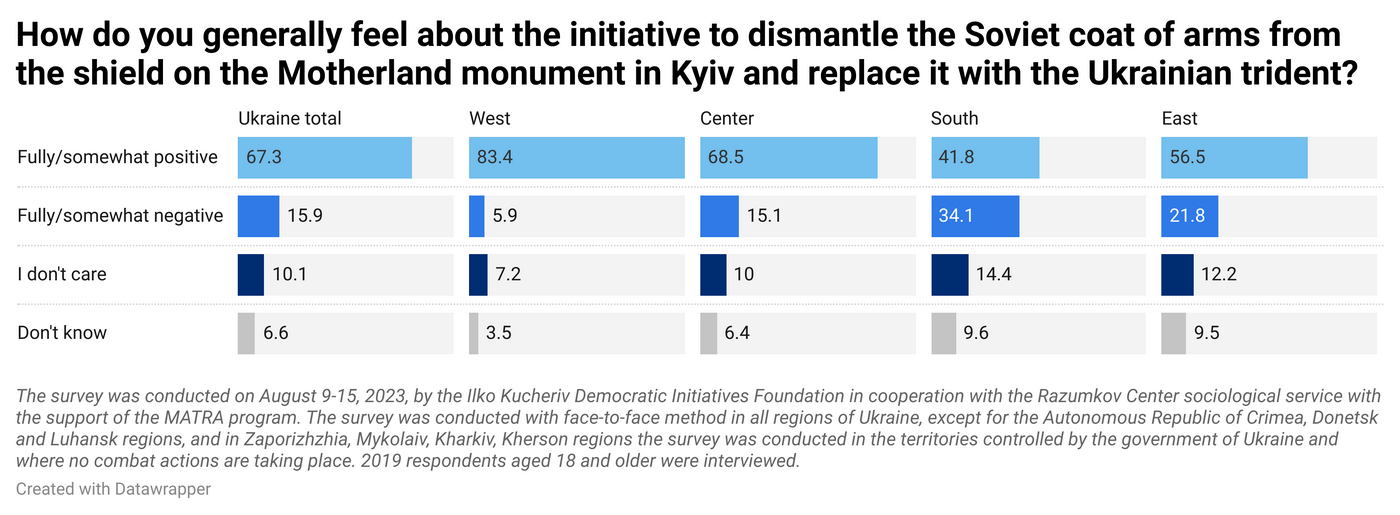 The share of such positive assessments is somewhat lower in the South (42%) and East (57%), as well as among older people (58%). However, even in these regions and age groups, positive assessments prevail.
The share of such positive assessments is somewhat lower in the South (42%) and East (57%), as well as among older people (58%). However, even in these regions and age groups, positive assessments prevail.
- The majority of respondents (70%) agree that the replacement of the Soviet coat of arms with a Ukrainian trident on the Motherland monument is an important event that symbolizes Ukraine's struggle for freedom and break with the Soviet past. About 17% disagree. As in the case of the overall assessment of the decision to replace the coat of arms, the above-mentioned judgment of the symbolism of the event is somewhat less approved in the South (56%) and East (59%) of Ukraine, as well as among the older age group (60% among those over 60 years old compared to 75% among young people aged 18-29).
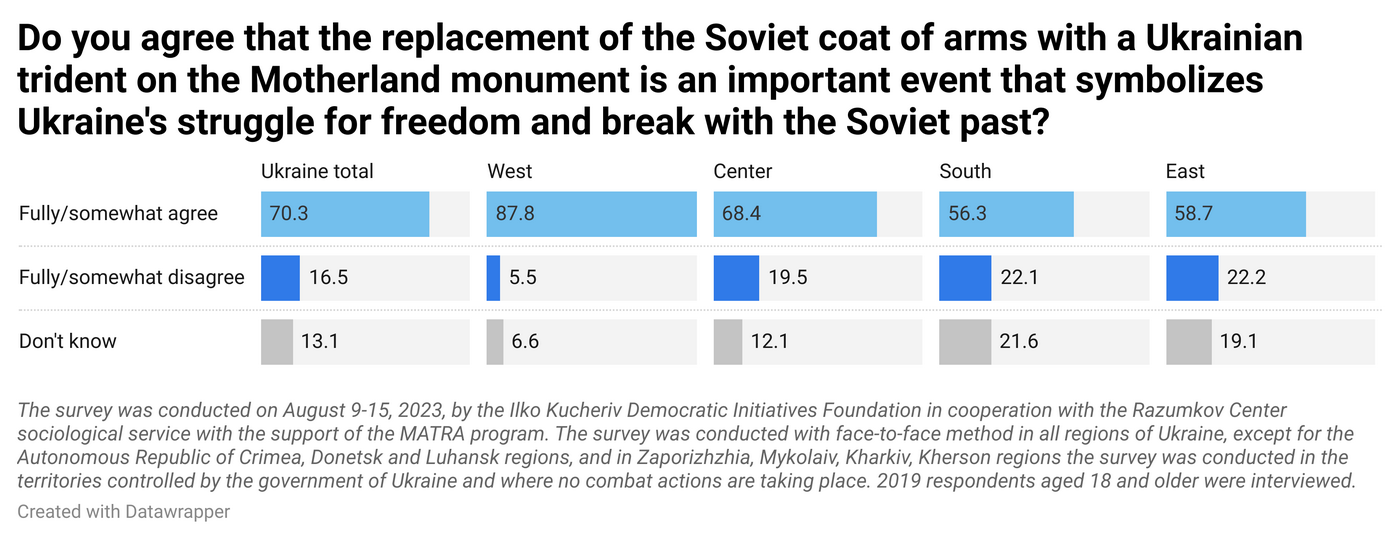
- At the same time, the majority of Ukrainians (69%) also agreed that it was possible to replace the Soviet coat of arms with a trident on the Motherland monument later (for example, after the war), but that it would be more appropriate to use the money to help the army and people affected by the war. About 21% of respondents disagreed. The highest number of those who agree with this statement was recorded in the South (76%), and somewhat lower in the East (60%).
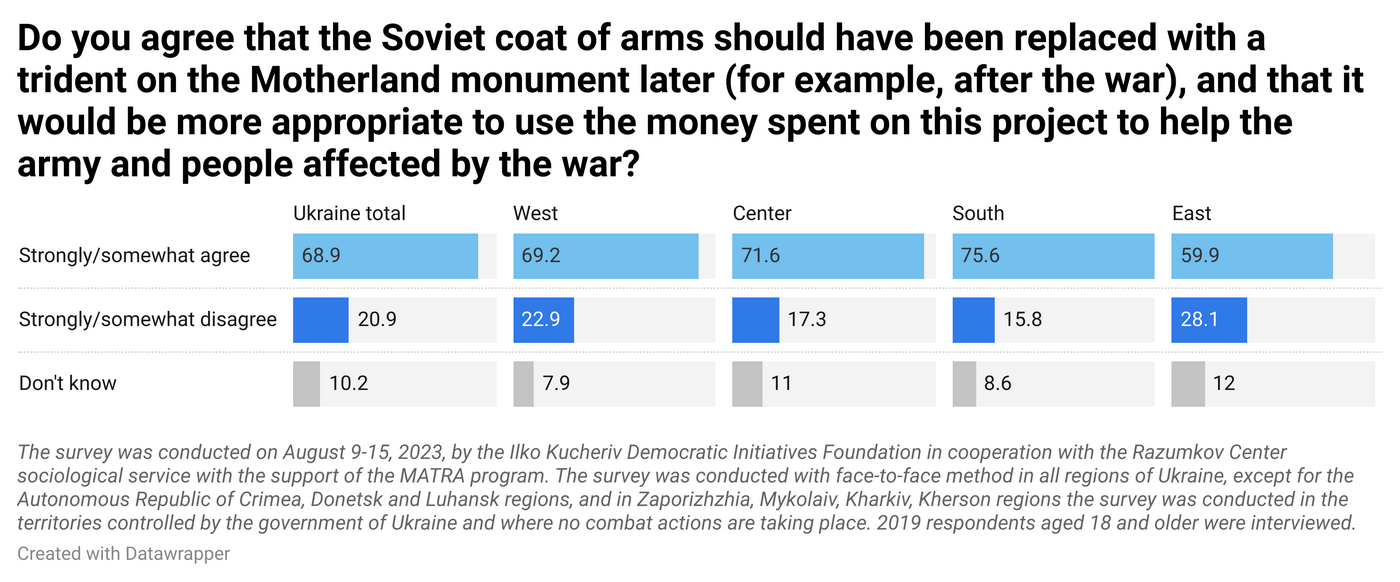
3. The way to victory or "war fatigue": Are Ukrainians ready to make concessions to the aggressor?
- The overwhelming majority of Ukrainians continue to be unwilling to compromise with the aggressor to end the war. Less than 5% of Ukrainians are ready to make territorial concessions to end the war. A slightly higher share (18%) expressed readiness to give up Ukraine's future membership in NATO. No more than 13% of Ukrainians are ready to accept the peacetime reduction of the Armed Forces, which was allegedly discussed in Istanbul in 2022. No more than 17-18% of respondents are ready to grant the Russian language official status or abandon the policy of decommunization to please the Kremlin.
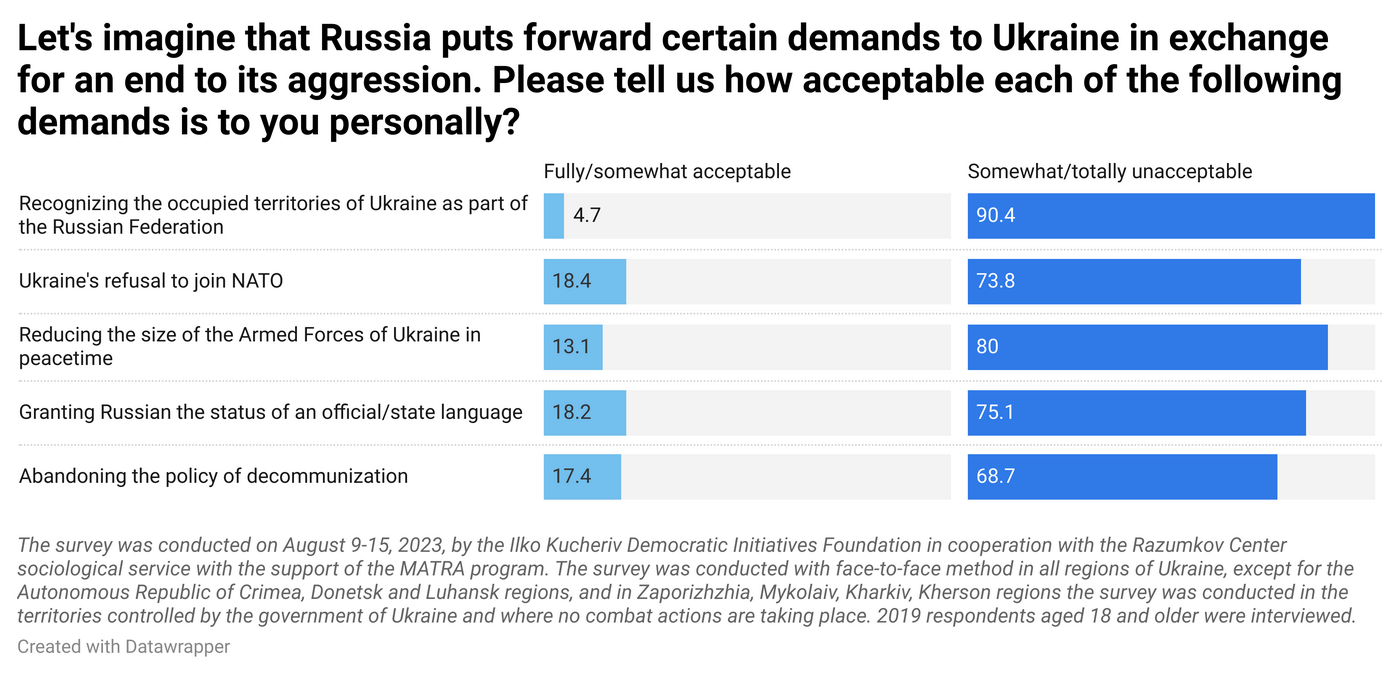
Respondents in the South and, to a somewhat greater extent, in the East, are slightly more ready to make concessions (except for territorial ones). However, even in these regions, the majority of respondents consider any of the above concessions unacceptable.
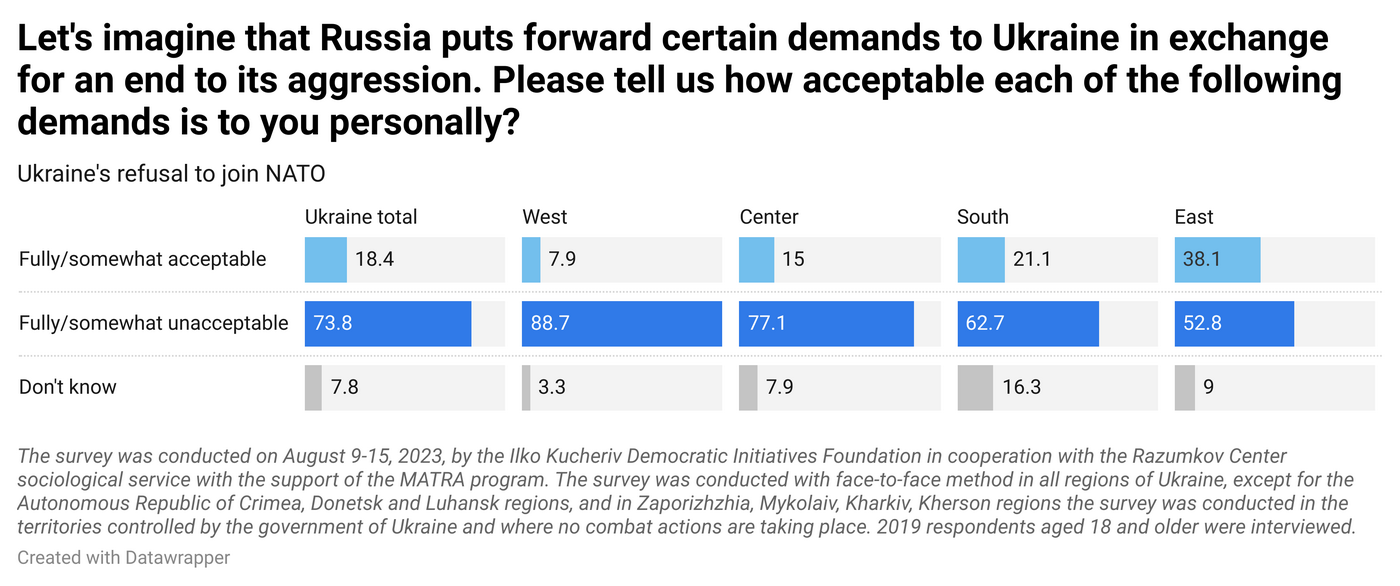
The analysis of the survey results also showed that about half of the respondents who believe that "any compromise is worth making for the sake of peace" (8% in total) actually consider the above-mentioned concessions by Ukraine unacceptable (in the case of territorial concessions - 2/3 of those saying that any compromise is worth making for the sake of peace).
Of those who think that "compromises can be made, but not all of them", 2/3 actually believe that no concessions from Ukraine are acceptable.
- Most Ukrainians do not believe that Ukraine's partners will significantly reduce their support for Ukraine if it does not achieve significant success on the battlefield in a counteroffensive over the next 3-4 months. Almost a third of Ukrainians agree with this, but a relative majority, about 46%, do not share this opinion.
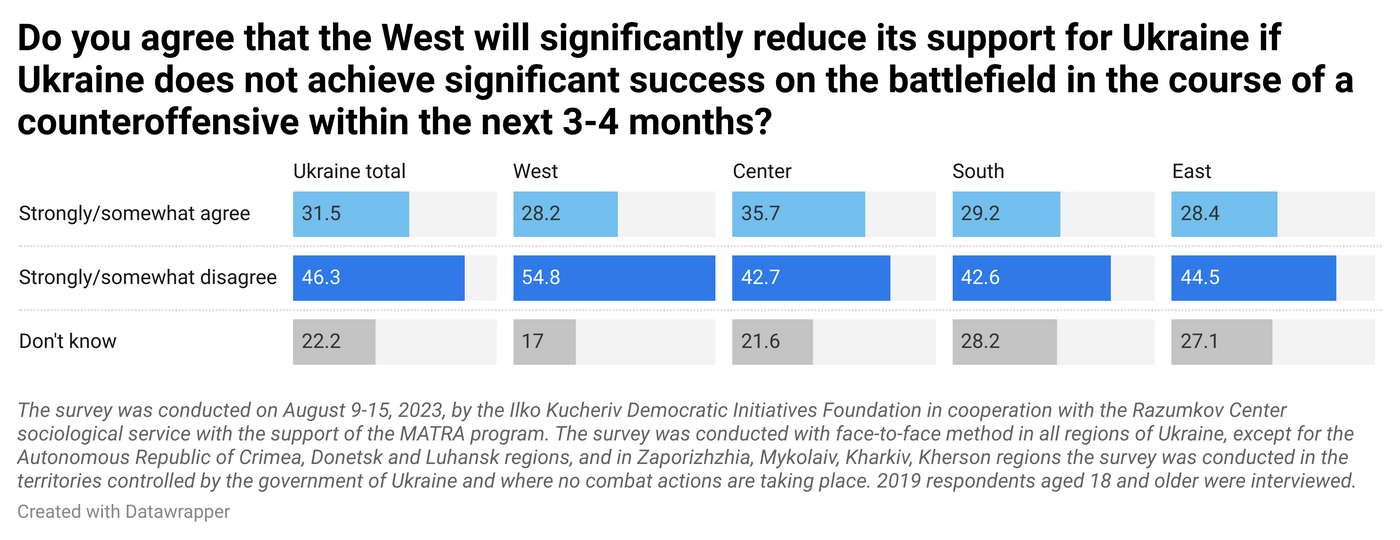
- A relative majority, 42% of Ukrainians, believe that if the aggressor intensifies rocket attacks on Ukrainian cities, leading to an increase in civilian casualties, Ukraine should continue to fight no matter what. Another 21% of respondents would prefer to try to freeze the conflict, but not to make concessions to Russia. Another 23% of respondents believe that in this case it is worth starting negotiations with the aggressor to end the war.
In the East and South, there are somewhat more people who believe that in this case it is worth starting negotiations with Russia to end the war than in the West and Center of Ukraine.
